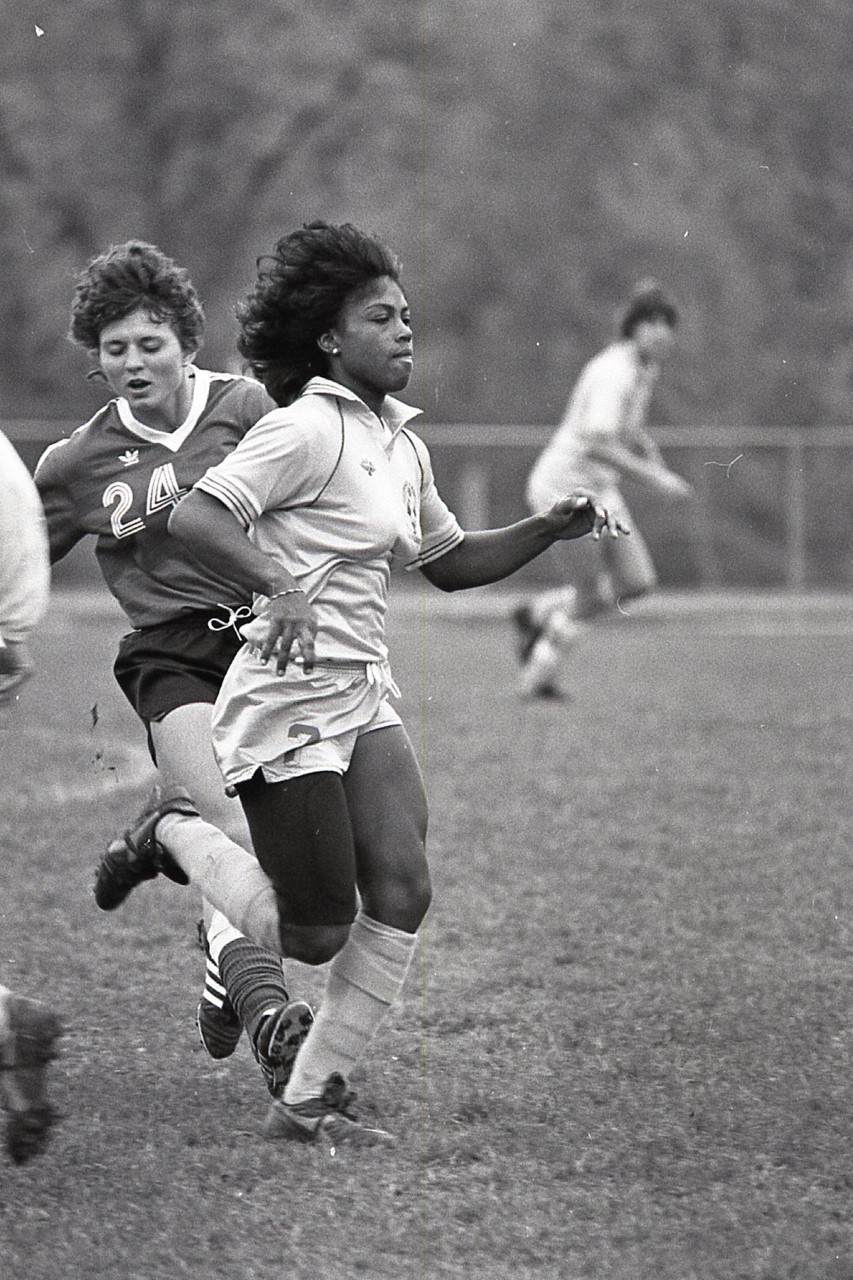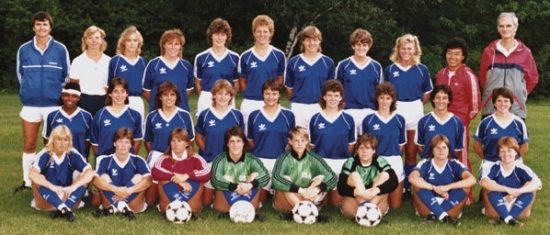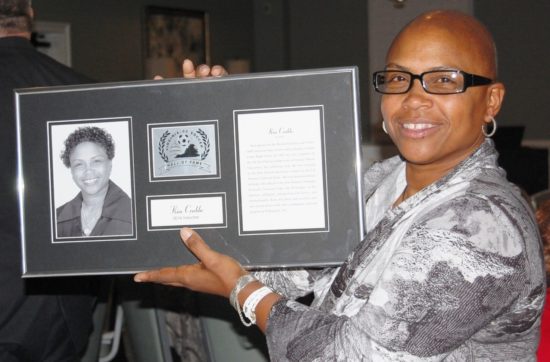Reid: Before there was Briana Scurry, there was Kim Crabbe
 By Justin Reid | Black Soccer Coaches Association
By Justin Reid | Black Soccer Coaches Association
Briana Scurry is a legend, a two time Olympic Gold Medalists (1996 and 2004), World Cup Champion (1999), and a recent National Hall of Fame inductee. But before there was Briana, there was Kim Crabbe.
An icon to the Black Soccer Community as the current Director of Youth Outreach for the Wilmington Hammerheads in North Carolina where she has enriched thousands of young lives in the inner cities by providing free soccer programs, Crabbe is also no stranger to the Washington, DC metropolitan area. She played soccer at South Lakes High School in Reston in the early 1980s and won the Women’s NCAA National Championship at George Mason University in 1985.
Her championship success at the college level propelled her to the top becoming the first African-American female to play for the U.S. Women’s National Team. In 2016, the Virginia Youth Soccer Association honored her by opening the doors to the Virginia-DC Hall of Fame. The award was just another accolade to Crabbe’s already amazing resume. But there has been just one more award missing in her illustrious career the National Soccer Hall of Fame.
+READ: Briana Scurry, Joe Machnik inducted into National Soccer Hall of Fame

Last year, the quest to become the first African-American woman to be inducted into the Hall of Fame was reversed. On August 3, 2017, it was Scurry became the first African-American woman to be nominated into the Hall of Fame, and she officially became inducted on February 10, 2018, during the U.S. Soccer Annual General Meeting in Orlando, FL, but Crabbe missed out.
When asked what an induction into the National Hall of Fame would mean to Crabbe she said, “I don’t want to say that there would be some closure [if inducted], honestly, I have never really even thought of it because it’s just not something that is on my bucket list. I began my playing career in Virginia and when I was inducted into the Virginia-DC Hall of Fame that meant more to me than anything in the world. I will also be inducted into my High School Hall of Fame in the coming months. [Being inducted in the National Hall of Fame] would be another nice accolade and wonderful achievement but it’s just not something that I am striving for.”
Many people have lobbied on Crabbe’s behalf to be inducted in the National Hall of Fame, but according to U.S. Soccer’s eligibility criteria she only qualifies for one of the four criteria and in order to be considered, she must meet two.
+Boehm: Lingering questions from U.S. Soccer’s presidential election
Crabbe never thought about herself being the first African-American woman to play on the National team until she was flown into Philadelphia for a documentary on African-American women in soccer at the national level back in 2000. Also present that day were Scurry, Staci Wilson, and Angela Hucles, among others. Crabbe noted that aside from the Producer of the documentary, only Wilson and Hucles knew who she was and that the others didn’t know that she was the first African-American to play on the U.S. Women’s National team. To this day when she attends forums like her most recent speaking engagement at the United Soccer Coaches event in Philadelphia in January, when asked who the first African-American woman to play on the national team was? The audience replied Hucles.
If Crabbe doesn’t get inducted into the National Hall of Fame, she wants one thing to carry on her legacy and that is for those to know her story. She wants not only the general public to know her history, but also African-American girls and women who aspire to play soccer. The way that the general public knows that Jackie Robinson was the first African-American to break the color barrier in Major League Baseball, is what she wants the world to know about her and the U.S. Women’s National team.
+Boehm: Notes from U.S. Soccer’s Board of Directors meeting
“When I see other African-American females playing soccer, I’d hope that my story will help some of them to gain more awareness on not just being able to identify with me but also to learn what it takes to get to the next level,” said Crabbe. “I think that because there are not a large number of African-Americans women playing at the elite levels, just having awareness about who came before them is important. I recently read Briana’s story on ESPN’s Undefeated, and it made me aware that despite an illustrious career filled with accomplishments, Briana dealt so many challenges after her playing career ended. More stories like these must come out and lets continue to look at the real story and gain awareness from that.”

Kim’s first year with the United States Women’s National team. (Pictured second row on the left)
As Crabbe continues to direct and influence the 900 inner city children in her program, she continues to remain excited about the future and the influence that she has instilled in her community. In collaboration with organizations such as Bruce and Earlina Yoder’s non-profit Off the Bench, where she has sent many players over the last seven years who would have never received an opportunity to attend the University of North Carolina’s Girls Soccer Camp to camp, and Sully Hamid’s Northern Virginia based soccer club Premier Athletic Club, who hosts a residential camp in the Blue Ridge Mountains in Virginia every July, Crabbe believes that her ultimate accomplishments in life is to give back to her community and provide opportunities to play the game that she loves, the way that others did for her.

Kim accepts Virginia-DC Hall of Fame award in 2016.
SOCCERWIRE MARKETPLACE
- visitRaleigh.com Showcase Series 2025, hosted by NCFC Youth
- OFFICIAL MANCHESTER CITY SOCCER CAMPS
- Wanted Licensed Youth Soccer Coach
- Join Official Elite Summer Soccer Camps with Europe’s Top Pro Clubs!
- The St. James FC Travel Staff Coach - North (Loudoun) & South (Fairfax)
- The St. James FC Girls Academy (GA) Head Coach - 2 teams
- The St James FC Boys Travel Tryouts
- OFFICIAL BAYERN MUNICH SUMMER CAMPS U.S.
- JOIN THE ALLIANCE!
- OFFICIAL FC BARCELONA CAMPS U.S.











